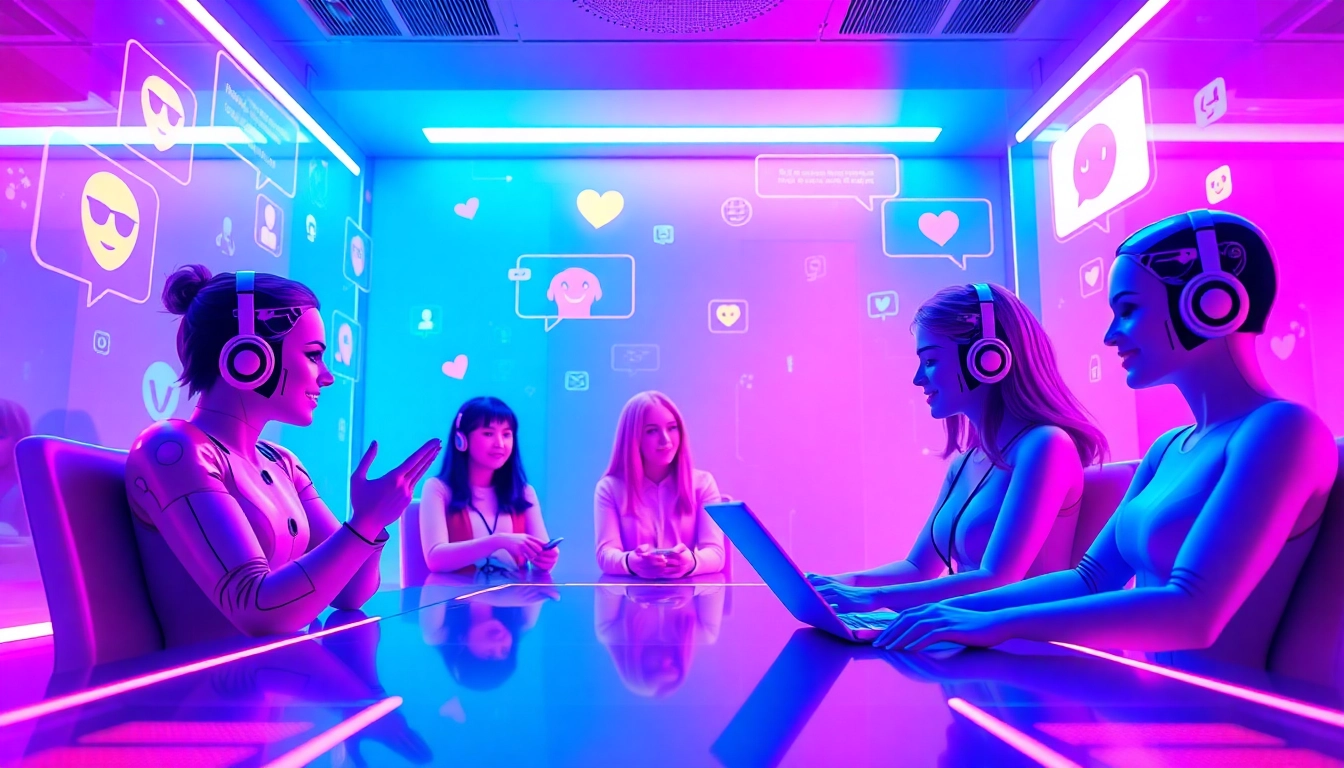The Evolution of Sex AI: Understanding the Basics
As technology continues to advance at a rapid pace, the realm of artificial intelligence (AI) is infiltrating various aspects of our lives, including our intimate relationships. The concept of sex ai has emerged as a pivotal theme in discussions regarding modern intimacy, pushing the boundaries of how we perceive connection, desire, and companionship. This article explores the evolution of sex AI, the technology behind it, its applications, and the ethical considerations it raises.
What is Sex AI and How Does It Work?
Sex AI refers to the application of artificial intelligence technologies to enhance, simulate, or facilitate human sexual experiences. It encompasses a wide array of tools, from chatbots and virtual companions to robotic devices designed for physical interaction. At its core, sex AI relies on algorithms that analyze user preferences, behaviors, and feedback to simulate realistic interactions. These systems utilize natural language processing (NLP) for conversational interfaces and machine learning to adapt and evolve based on user input.
Key Technologies Driving the Sex AI Revolution
Several technologies are propelling the sex AI sector forward:
- Natural Language Processing (NLP): Enables machines to understand, interpret, and respond to human speech in a conversational manner.
- Machine Learning: Allows AI systems to learn from data and improve their responses over time, creating a more personalized experience for users.
- Virtual Reality (VR): Provides immersive environments where users can engage with AI companions in lifelike scenarios.
- Robotics: Physical sex toys and robots equipped with AI to interact with users physically and emotionally.
Benefits of Integrating Sex AI into Daily Life
Incorporating sex AI into daily life offers several potential benefits:
- Enhanced Sexual Education: AI can provide personalized advice and information, helping individuals understand their sexuality better.
- Improved Communication: Sex AI can facilitate discussions about preferences and boundaries, leading to healthier relationships.
- Accessibility: For individuals with disabilities or those lacking traditional intimacy, sex AI can provide an alternative source of companionship.
- Emotional Support: AI companions can offer companionship and emotional support, contributing to overall mental well-being.
Addressing Concerns: Safety and Ethics of Sex AI
As with any emerging technology, the integration of sex AI raises important ethical and safety considerations. Understanding these implications is crucial for promoting responsible use.
Understanding the Ethical Implications of AI in Intimacy
The ethical implications of sex AI are vast, ranging from questions about consent to the potential for emotional attachment with AI entities. Critics argue that reliance on AI for intimacy might reduce genuine human interaction and emotional depth in relationships. Furthermore, the design of sex AI programs often reflects societal biases, potentially leading to the reinforcement of harmful stereotypes regarding gender and sexuality.
Addressing Privacy Concerns with Sex AI Applications
Many sex AI applications require users to input personal information and preferences, which raises significant privacy concerns. Data breaches or misuse of sensitive information can have dire consequences. It is vital for developers to implement robust security measures and for users to remain informed about how their data is being used and stored.
Preventing Misuse and Protecting Users in the Digital Era
To prevent misuse, developers of sex AI programs must establish clear guidelines and ethical frameworks. This includes measures to prevent exploitation, such as ensuring that AI companions are not used to perpetuate abusive or harmful interactions. Users also need education on recognizing safe and responsible practices when engaging with AI technologies.
Practical Applications: How to Use Sex AI Effectively
When it comes to leveraging sex AI effectively, understanding its practical applications is essential. The following sections outline top tools, integration into therapy, and real-world examples of successful interactions.
Top Sex AI Tools for Enhanced Relationships
There are various sex AI tools that individuals and couples can utilize to enhance their relationships, including:
- AI Chatbots: Programs like Replika allow users to create personalized digital companions that can converse and provide emotional support.
- Interactive Sex Toys: Devices like OhMiBod sync with music and can be controlled remotely, allowing for shared experiences among partners.
- Virtual Reality Experiences: Platforms like Virtual Reality Sex (VRS) provide immersive environments where users can interact with AI-generated avatars.
Integrating Sex AI into Therapy and Counseling
Sex AI can also play a pivotal role in therapy and counseling environments. Therapists may utilize AI tools to facilitate conversations about intimacy and sexuality, helping couples navigate their desires and issues more openly. Moreover, AI can provide personalized exercises and simulations for couples to practice communication and improve their intimacy skills.
Real-World Examples of Successful Sex AI Interactions
Several examples highlight how sex AI can positively impact relationships:
- A couple used an AI chatbot to explore fantasies they were uncomfortable discussing in person, leading to an improved understanding of each other’s desires.
- Individuals have reported increased confidence and self-awareness in their sexual identities after interacting with personalized AI companions.
Challenges and Limitations of Current Sex AI Technologies
Despite the advancements in sex AI, there are several challenges and limitations that users and developers must acknowledge.
Common Misconceptions about Sex AI Capabilities
Many misconceptions surround the capabilities of sex AI. For instance, some users may expect human-like emotional responses from AI, while others may assume that AI can fully replace human interaction. In reality, while sex AI can provide companionship and support, it lacks the depth of human emotion and connection.
Acknowledging Limitations in User Interactions
Users should also be aware of the limitations inherent in current sex AI technologies. Interactions can sometimes be awkward or unrealistic, which may lead to frustration. Additionally, the AI’s ability to understand complex emotions and context can still be limited, highlighting the importance of maintaining realistic expectations.
Future Upgrades Needed for Optimal Performance
To enhance the effectiveness of sex AI, future developments must focus on improving emotional intelligence and contextual understanding. This will involve refining algorithms and expanding the datasets used for training AI systems to better reflect human interactions.
Looking Ahead: The Future of Sex AI in 2025 and Beyond
As we move towards 2025, the future of sex AI is filled with potential and possibilities. Several trends and predictions outline how this technology may further evolve and impact our lives.
Predicted Trends in AI for Sexual Wellness
Future trends in sex AI are likely to include:
- Increasing Personalization: AI tools will become more customized, adapting to individual preferences, desires, and emotional needs.
- Enhanced Interactivity: Virtual reality and augmented reality advancements will allow for more immersive experiences between users and AI companions.
- Integrative Health Solutions: Sex AI will increasingly be incorporated into holistic health and wellness programs, promoting sexual health awareness and education.
How Sex AI Could Revolutionize Intimacy and Relationships
As technology continues to develop, sex AI has the potential to revolutionize how we approach intimacy and relationships. By providing tools for communication and exploration, individuals and couples may find new avenues for connection and understanding, fostering healthier relationships overall.
Expert Insights on the Long-Term Impact of Sex AI
Experts in AI and relationship psychology predict that as sex AI becomes more sophisticated, it will not only enhance personal intimacy but also challenge societal norms surrounding relationships and sexuality. This continued evolution is likely to provoke ongoing discussions regarding ethics, boundaries, and the definition of human connection itself.



